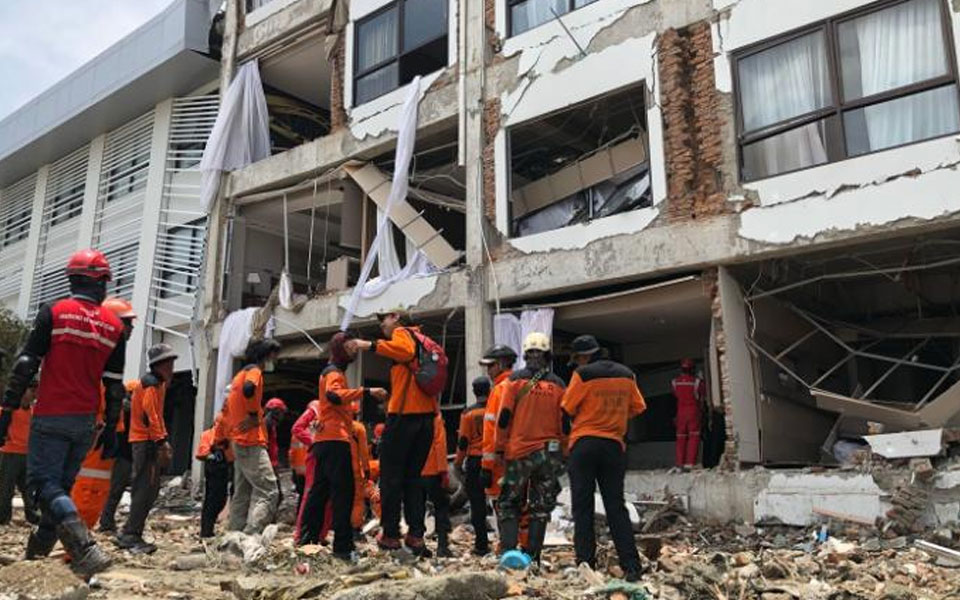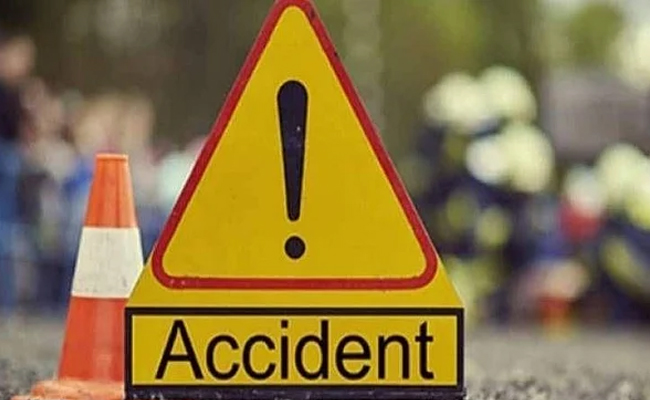Palu, Oct 5 : Search teams made desperate last-ditch efforts Friday to find survivors, a week on from Indonesia's devastating quake-tsunami, as the death toll from the disaster rose above 1,500.
The city of Palu on Sulawesi island has been left in ruins after being hit by a 7.5 magnitude quake and a wall of water, which flattened homes, ripped up trees and overturned cars.
After days of delays, international aid has finally started to arrive in the disaster zone, where the UN says almost 200,000 people are in need of humanitarian assistance.
Survivors have ransacked shops and supply trucks in the hunt for basic necessities, prompting security forces to round up dozens of suspected looters and warn that they will fire on thieves.
Authorities previously set a tentative deadline of Friday for finding anyone trapped under ruined buildings, although chances of pulling survivors alive from the rubble at such a late stage are almost zero.
Local military spokesman Muhammad Thohir said that the death toll had risen to 1,558, up about 100 from the previous official figure.
Over 100 people are still unaccounted for, while hundreds of bodies have been buried in mass graves in a bid to avert a disease outbreak from corpses rotting in the tropical sun.
Search efforts focused on eight key locations Friday, including a beach and the Balaroa area where the sheer force of the quake turned the earth temporarily to mush.
"We have to use heavy equipment now because it is very difficult to sift through the rubble by hand," Yusuf Latif, a spokesman for Indonesia's search and rescue agency, told AFP.
At the badly damaged Mercure hotel on Palu's waterfront, there was growing frustration among a French and Indonesian search team.
The rescuers, using sniffer dogs and scanners, had detected what they believed was a person under mounds of rubble the previous evening but when they resumed the hunt early Friday, any signs of life had disappeared.
"Yesterday we had a heart beat and sign of breathing, there were no other movements so it means it was someone who was motionless, confined," said Philippe Besson, president of the International Emergency Firefighters.
A week on from the disaster, some roads in the area remain impassable, detritus from the tsunami is scattered everywhere while terrified people are sleeping outside for fear of further quakes.
Improvised white flags -- a pillow case or duvet cover -- fly outside many homes, signifying a death in the family.
Nevertheless there were signs of life returning to normal, with children playing in the streets, radios blaring out music, and electricity back up and running in most places.
"Things are improving," Azhari Samad, a 56-year-old insurance salesman, told AFP at a mosque in Palu.
But for the area to recover fully from the disaster "will take years", he added.
"The first six months will be traumatic, maybe in one year we have some progress. The government will help, people will help from all over the country. Indonesians have a big heart." Samad spoke to AFP ahead of Friday prayers in the world's biggest Muslim majority country.
Sulawesi is also home to a large Christian minority.
About 20 planes carrying vital supplies such as tarpaulins, medical equipment and generators are now heading from all over the world to the disaster zone after a long delay.
Indonesia was initially reluctant to accept outside help, insisting its own military could handle the response, but as the scale of the devastation became clear President Joko Widodo agreed to allow in foreign aid.
Governments from Australia to Britain are flying in supplies, the United Nations has pledged 15 million to the relief effort, and aid groups including Save the Children and the Red Cross are also on the ground.
Let the Truth be known. If you read VB and like VB, please be a VB Supporter and Help us deliver the Truth to one and all.
Bengaluru (PTI): A 22-year-old man has been arrested for allegedly killing his uncle following a dispute over vacating a house and attempting to pass off the death as accidental, police said on Wednesday.
The accused has been identified as Masroor Ahmed.
The victim, Inayath Pasha, was living alone on the ground floor of his sister’s house in Austin Town on a lease basis. Police said he had a disability in his left leg due to polio since birth, and earned his livelihood as a two-wheeler mechanic.
According to the complaint, on the evening of March 1, Pasha’s son visited him at home and found him lying unresponsive.
On checking, he discovered that his father had died. A case of unnatural death was initially registered at the Viveknagar police station.
During further investigation, police questioned Pasha’s sister, her son, and other relatives.
A relative raised suspicion about the circumstances of the death, following which a murder case was registered, a senior police officer said.
During interrogation, it emerged that an argument had taken place on March 1 between Pasha and his nephew, Ahmed, over vacating the house.
Police said that during the altercation, Ahmed allegedly assaulted Pasha, causing him to lose consciousness and collapse.
The accused then placed him on the bed and left the scene, police added.





